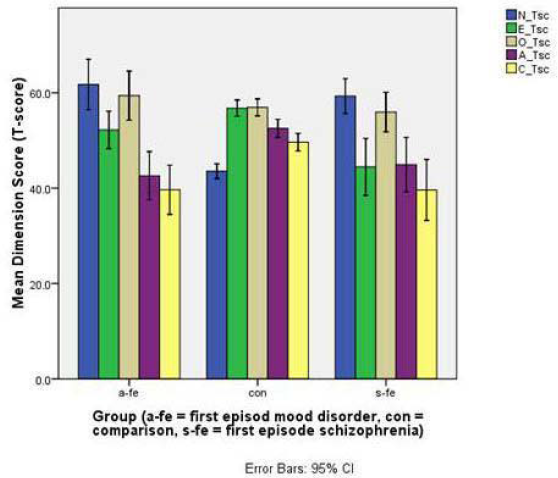No CrossRef data available.
Published online by Cambridge University Press: 17 April 2020
To compare “big five” personality trait dimensions in psychiatrically healthy individuals and first episode psychosis (schizophrenia and bipolar disorder).
Clinically stable patients with first episode schizophrenia (22M, 4F) and bipolar disorder (24M, 8F), and psychiatrically healthy subjects (101M, 36F), completed the NEO-FFI personality inventory. The NEO-FFI is a 60-item self-assessment questionnaire that measures the major personality trait dimensions of neuroticism (N), extraversion (E), openness (O), agreeableness (A) and conscientiousness (C); it has good reliability and cross-cultural validity (McCrae et al, J Res Person, 2004;38:179-201). Gender-specific T-scores were analyzed using standard multivariate statistical techniques.
As expected, age correlated with personality dimensions in the entire sample (N= -.144, p= .045; O= -.169, p= .018; A= .228, p= .001; C = .150, p= .037). MANOVA with dimension scores as dependent variables, diagnosis as a fixed factor independent variable, and age as a covariate demonstrated that schizophrenia and bipolar groups were statistically similar on N, A, and C. Both patient groups were significantly higher than comparison subjects on N and lower on A and C (see Figure). All three groups differed significantly on E (schizophrenia < bipolar < comparison), but no groups differed on O.
Personality deviations are present in first episode schizophrenia and bipolar disorder, and are similar to abnormalities previously described in patients with more chronic illness.
Fig. 1
[NEO Dimension Scores by Group]

Comments
No Comments have been published for this article.